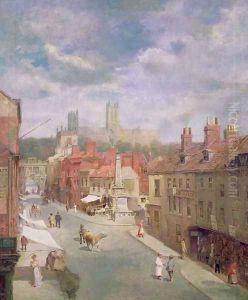F.A. Jackson Paintings
Francis Alexander Jackson, more commonly known as F.A. Jackson, was a British artist born in the late 19th century, whose work spanned the first half of the 20th century. Jackson's contributions to the art world are primarily recognized in the realms of illustration, painting, and teaching, reflecting the dynamic shifts in artistic styles and educational methodologies of his time. His life and career offer a window into the evolution of British art during a period marked by both war and profound social change.
Jackson was educated at the prestigious Royal College of Art in London, where he later returned as an instructor, thus influencing a generation of British artists. His early work was deeply rooted in the traditions of the Arts and Crafts movement, emphasizing the importance of craftsmanship and the beauty of nature. However, as his career progressed, Jackson began to incorporate more modernist influences into his work, demonstrating his adaptability and willingness to explore new artistic languages.
Throughout his career, Jackson was known for his illustrations, which appeared in numerous books and publications. These works often featured landscapes and scenes of rural life, capturing the essence of the British countryside with a delicate and detailed touch. His illustrations were celebrated for their ability to convey mood and atmosphere, qualities that were also evident in his landscape paintings.
In addition to his work as an artist and illustrator, Jackson's legacy includes his role as an educator. His teaching at the Royal College of Art and other institutions was highly influential, shaping the practices and philosophies of emerging artists. Jackson's approach to art education, which encouraged experimentation and personal expression, reflected broader shifts within the art world towards more modernist sensibilities.
F.A. Jackson's death in 1954 marked the end of a career that had witnessed significant transformations in British art. His body of work, spanning illustrations, paintings, and educational contributions, remains a testament to his versatility and his ability to adapt to the changing landscapes of art and society. Jackson's influence continues to be felt, not only in the works of his students and contemporaries but also in the appreciation of those who continue to study and admire British art from the early 20th century.
